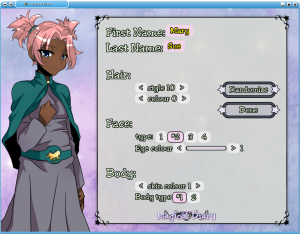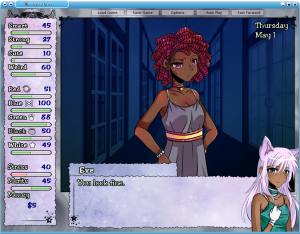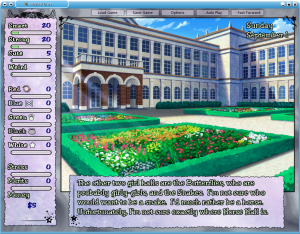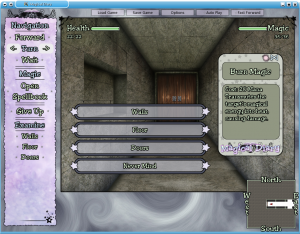I’ve never really been a fan of either the Visual Novel or its sub-genre the Dating Sim. Imagine my surprise, then, when I discovered that the game I bought on a whim during the Linux Steam sale was just such a game. Nevertheless, it was a game that purportedly worked on Linux, so I gave Magical Diary a try.

The default character name is “Mary Sue”. I’m not sure if the creators were trying to be self-aware and ironic or if someone just gave up.
The premise of Magical Diary is that you’re a “wildseed” magic user–born to normal parents and then whisked away to learn the ways of magic once you reach the appropriate age. The game opens at the beginning of the freshman year of high school for your main character. You have two roommates (the studious one and the sporty/carefree one) and are thrust into the life of a high school magician with very little guidance.
The game progresses in three parts. Firstly, you decide your character’s actions for each week–which classes you’ll go to (or not) each day. In between (and sometimes during) your activities, you might run into the second part which is your standard visual novel type interactions with other students and teachers at the school. The last bit are the periodic “practical exams” wherein your character is dumped into a first-person dungeon and must use their magic to escape.
Unfortunately, though, each of these bits is rather lackluster. Doing activities during the week grant you a random zero to three point bonus to a relevant skill. The problem is the random bit. Since the game allows saving at any point, the best course of action quickly becomes scumming each week until you get an average or better result. This makes one of the other core mechanics–stress increasing failure rates–into a non-mechanic. If you’re already scumming the random number generator, why not do it a bit more?
The visual novel bits suffer from two main problems. Firstly, there are a large number of characters who seem interesting introduced near the beginning of the game. Of them, almost none can be interacted with. In fact, the number of pursue-able characters in the game is about six. And two of those are incredibly grating. The second is the classic problem of this sort of game–completely unclued events. If you go and look at a calendar of events for this game, there are dozens of missable events which are triggered by going to certain places on certain days. The vast majority of these have no clues to suggest that doing them is any better than doing anything else. These are both classic problems in the genre and new games shouldn’t still be making the same mistakes.
The dungeons/practical exams are probably the most interesting part of the game. As your character levels up her magic, she gains spells. Mostly, these are useless items kept in a list. Periodically, they might provide an additional option during a visual novel scene. In dungeons, though, you can finally make use of them. The first real exam, for instance, puts you at one end of an empty chasm. If you’ve focused on force magic, you can push a bridge over to fill the gap. If you’ve done teleportation magic and some scrying magic you can just zip across. This does suffer a bit from the Deus Ex Problem: if every school of magic needs a way to succeed then any school of magic can succeed. For instance, it also turns out that having about 30 points to the teleportation school of magic can get you successfully through every single exam, by itself.

Every Mary Sue character should have cat ear, right? Too bad I couldn’t afford the fairy wings, too. You can see my whole character here.
Perhaps worst of all, though, is that the game lacks real meat. The plot is short, and, because it only covers a single year of school, it lacks anything like finality or resolution. It simply ends. Couple this with its other, more concrete flaws, and it becomes a game that I cannot recommend.
Magical Diary: 0


